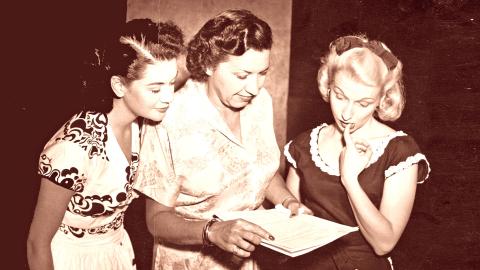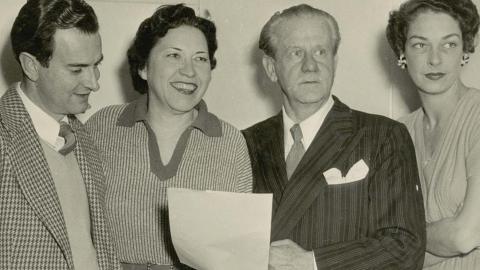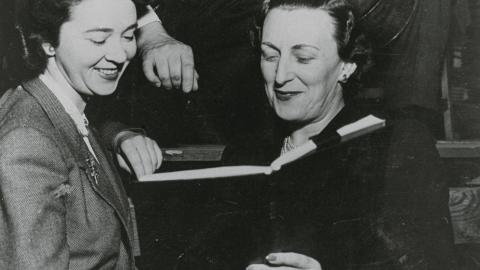

Women leaders in radio
The NFSA joined with nine other organisations in 2014 to promote a new understanding of Australian women’s leadership in the 20th century. The result was Australia’s first online Encyclopedia of women leaders. As part of the project we highlighted the cultural achievements of nine outstanding women in film, radio and television.
Dorothy Muriel Crawford

Dorothy Crawford not only excelled as a radio drama producer, but was also a pioneer in the production of Australian television drama. Known within the industry as a hard taskmaster, Crawford was respected for her knowledge and attention to detail. As co-founder of Crawford Productions she made a significant contribution to the success of the company, which not only dominated radio production in Melbourne, but was one of the few independent production companies to successfully transition from radio to television in Australia.
Born in Melbourne in 1911, Dorothy Crawford studied at the Albert Street Conservatorium in the Victorian Artists’ Society.
Following her studies she initially focused on speech and drama, becoming an elocution teacher and leading the Dorothy Crawford Players, who performed at church and charity functions. Crawford entered the group in amateur dramatic radio competitions and this led to her being offered regular radio appearances on Melbourne station 3UZ in 1939, playing various characters on the program Happy Days, as well as the title role in the comedy series Little Audrey. In 1942 she was engaged by the ABC as an announcer but left to join her brother Hector at the Melbourne radio production company Broadcast Exchange in 1944. A year later with the help of David Worrall, manager of the radio station 3DB, the siblings started their own production company. During their early days in radio production, the Crawfords also established the Crawford School of Broadcasting to train radio announcers.
Dorothy Crawford’s experience in both music and drama was evident in her production of several innovative radio series, editing, casting and producing each script. Broadcast in 1946, The Melba Story, a radio dramatisation of Nellie Melba’s life with music, featured the newly discovered singer Glenda Raymond with the Australian Symphony Orchestra conducted by Hector Crawford. The series The Blue Danube, a dramatised musical story of the life of Johann Strauss, was awarded the Federation of Commercial Broadcasting Stations Academy Award for the best half-hour radio program of 1948. In an ambitious move, Dorothy Crawford produced a series about the American theatrical impresario Oscar Hammerstein, The Amazing Oscar Hammerstein, said to be the costliest Australian radio production when it premiered in 1954. The reputation of the company was established by the success and popularity of such series, which incorporated concepts that may have seemed initially highbrow and uncommercial. Another successful vein for their radio drama proved to be crime. The crime series D24 was based on files from the Victorian Police Force, who sponsored production costs and studio time for the first two years. This concept was later transformed into the successful television series Homicide.
Crawford’s reputation as a perfectionist was well earned. She not only excelled in writing, directing and acting, but also had the desire and ability to pass on her knowledge to others. In 1954, the Crawfords set up a television workshop where writers, editors and producers were trained in the new medium. In 1960, Crawford produced Seagulls Over Sorrento for HSV 7 Melbourne, the first full-length television drama produced by an independent TV production company.
Dorothy Crawford retired in 1974 and passed away in 1988.
1946 radio drama The Melba Story tells the story of Nellie Melba’s life. Provided courtesy of Crawford Productions Pty Ltd. NFSA title: 196592
BY MARYANNE DOYLE
References
Archival
Pullman, Wynne interviewed by Beverley Dunn, NFSA title: 270522
Crawford, Hector interviewed by Albert Moran, NFSA title: 269138
Published
‘Academy Award of the Radio’, Examiner, 7 January 1949
‘It’s A Family Verdict’, The Australian Women’s Weekly, 4 July 1962, p 38
Lane, Richard and National Film and Sound Archive of Australia, The Golden Age of Australian Radio Drama 1923-1960: A History Through Biography, 1994, Melbourne University Press, Carlton South, Vic
Moran, Albert and Keating, Chris, The A to Z of Australian Radio and Television, 2009, Scarecrow Press, Lanham
‘New £20,000 Serial From 5 AD’, The Advertiser, 26 June 1954, p 11
‘Radio Features: Broadcast from Cruiser’, The Advertiser, 2 February 1946, p 7
‘Radio Plays’, The Argus, 24 August 1938, p 2
Online
D24 Episode 8 – Taxi Murder, NFSA Australia SoundCloud
Rogues Gallery Episode 1 – Captain Moonlite, NFSA Australia SoundCloud
Lynn Foster

Born in Sydney in 1914, Lynn Foster aspired to be a writer and spent her teenage years writing numerous plays. She would later become an important pioneer in the radio industry, being the first woman in Australia to direct a major radio serial on a national network, as well as the first to write and direct one. She also played a major part in the advancement of the status of writers in the radio industry.
Lynn Foster was 19 when she was offered a job at the radio station 2UE Sydney after winning second prize in a 2UE playwriting competition. While initially only writing small pieces for 2UE, in 1936 she began writing scripts for the Broadcasting Service Association production unit, whose programs were broadcast around Sydney on 2GB and 2UE.
Preferring freelance work, Foster wrote for a number of different sponsors during the war years before becoming the main adaptor of radio scripts from America for Lux Radio Theatre. In 1942, Foster became the director of the serial Big Sister, the first nationally sponsored morning serial, billed as ‘the first Australia-wide show designed exclusively for women, with the biggest cast of stars in any show on the air’. Adapted from American scripts, the serial was extremely popular, attaining top ratings during its five-year run. Lynn Foster’s direction on Big Sister gained her enormous respect among her peers and colleagues; they fondly dubbed her ‘The Sergeant’ due to both her authority and iron discipline.
In 1944, Texas-born radio producer Grace Gibson began her own radio production company in Sydney, Grace Gibson Productions, and chose Lynn Foster as the company’s first director. In 1945, Foster wrote the radio play Lost Generation to assist in the sale of war bonds, first directing a cast of leading radio actors and later adapting the play for theatre.
Lynn Foster’s experience and authority led to her becoming the spokesperson for writers in commercial radio when they successfully lobbied to be transferred industrially from the Australian Journalists’ Association to Actors’ Equity. This laid the foundations for the formation of the Australian Writers’ Guild, where she would later become a member of the management committee.
After Big Sister finished in 1946, Lynn Foster wrote and directed the serial Crossroads of Life, this time using all original scripts. Foster travelled to London in 1949 where she stayed for 20 years, writing radio and television scripts. After returning to Sydney in 1970 she worked as a writer and script editor on the television soap opera Number 96. She passed away in Sydney in 1985, aged 71.
1946 radio drama The Melba Story tells the story of Nellie Melba’s life. Provided courtesy of Crawford Productions Pty Ltd. NFSA title: 196592
BY CHRIS ARNEIL
References
Archival
Foster, Lynn interviewed by Diana Combe, NFSA title: 191376
Published
‘Every Day Brings Another Play: Sydney Girl’s High-speed Job’), The Australian Women’s Weekly, 31 October 1936, p 38
Lane, Richard and National Film and Sound Archive of Australia, The Golden Age of Australian Radio Drama 1923-1960: A History Through Biography, 1994, Melbourne University Press, Carlton South, Vic
‘The World of Women: Writes and Produces Plays for Radio’, The Examiner, 7 January 1947, p 5
Grace Isabel Gibson

American born Grace Gibson established one of the most successful radio production companies in the world. An astute businesswoman, Gibson brought to Australia the latest technology and business practices from the radio industry in Hollywood.
Born in Texas in 1905, Grace Gibson moved to California to finish her schooling. Her first job was for ’La Fiesta de Los Angeles’, an event celebrating the 150th anniversary of the founding of Los Angeles in 1931. Though not necessarily seeking a career in radio, her next position was as office secretary for the Hollywood recording division of the Radio Transcription Company of America or TRANSCO. This company was one of the earliest producers of radio transcriptions, which were recordings of radio programs on discs that could be distributed to a number of radio stations.
In late 1933 Gibson successfully sold a number of radio programs to a visiting Australian station executive, AE Bennett, manager of the Sydney radio station 2GB. On his return to Australia, Bennett offered Gibson a six-month contract to take up the role of secretary for the new transcription department of radio station 2GB in Sydney, which aimed to sell American serials to stations all over Australia.
Gibson arrived in Sydney in May 1934 and together with Bennett established the American Radio Transcription Agency (later called ARTRANSA). Gibson introduced early American serials in Australia including: Pinto Pete and his Ranch Boys and the Air Adventures of Jimmy Allen. In 1935 Gibson was probably the only woman in the world to be heading up a radio transcription company.
Though Gibson found that Australia was less welcoming to women in executive roles than the United States, she decided to stay on in Australia. She did however return to Hollywood for a buying trip in late 1941, just before the bombing of Pearl Harbour, and was unable to return to Australia for several years. During her enforced stay in the USA, Gibson was made managing director of the Transcription Company of America.
Returning to Australia she formed Grace Gibson Radio Productions in 1944. Considered careful where money was concerned she was also generous to her staff and was admired for her skill at sales and her total commitment to work. Gibson’s company specialised in soap operas and serials, ranging from long-running family dramas Dr Paul and Portia Faces Life, to crime serials Night Beat and Dossier on Dumetrius. Scripts were often imported from the United States and adapted for Australian audiences and then syndicated to radio stations across Australia, New Zealand, South Africa, Hong Kong and the West Indies. Many shows were so popular that they were still produced for up to 14 years after the original American scripts ran out, employing local writers to take over.
In 1952 Gibson made a serious attempt to expand her business into the new broadcasting medium by making a television pilot. Due to the financial risks involved, Gibson chose not to proceed with any further television productions. However she provided assistance to Frank Packer in his successful application for a Sydney television licence. Gibson continued to produce radio programs for some years following the introduction of television.
When Gibson sold the business in 1978, Grace Gibson Productions had produced and sold around 40,000 quarter-hour episodes. In recognition for her services to radio, Gibson was awarded the Order of Australia in 1987. She passed away in 1989.
A later episode (circa 1963) of long running Grace Gibson Productions radio serial Dr Paul, featuring Brigid Lenihan (Molly), Laurel Mather (Elizabeth) and Amber Mae Cecil (Leota). NFSA title: 202616
BY MARYANNE DOYLE
References
Archival
Gibson, Grace interviewed by Jenny Anderson, NFSA title: 817755
James, Reg interviewed by Bruce Leonard, NFSA title: 260093
Vine, Valerie interviewed by Beverley Dunn, 1993, NFSA title: 268925
Vine, Valerie interviewed by Beverley Dunn, 1994, NFSA title: 272071
Published
‘AN AMERICAN GIRL Sells Sixty-Two RADIO SERIALS’, The Australian Women’s Weekly, 2 March 1935, p 25
‘Deadly Nightshade on 5AD’, The Advertiser, 3 July 1952, p 11
‘John Quinn’s RADIO ROUND UP’, The Mail, 5 July 1952, p 26
Lane, Richard and National Film and Sound Archive of Australia, The Golden Age of Australian Radio Drama 1923-1960: A History Through Biography, 1994, Melbourne University Press, Carlton South, Vic
Online
Moran, Albert ‘Some beginnings for Australian television’, Continuum: The Australian Journal of Media & Culture, 1991, Vol 4 No 2
The National Film and Sound Archive of Australia acknowledges Australia’s Aboriginal and Torres Strait Islander peoples as the Traditional Custodians of the land on which we work and live and gives respect to their Elders both past and present.


